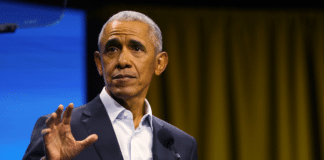The Supreme Court ruled Monday to allow students to sue for monetary damages against a Georgia college that blocked the distribution of religious pamphlets, giving new ammo for campus free-speech lawsuits.
The ruling increases the potential of liability and legal costs for schools if they are found to have infringed students’ First Amendment rights.
The high court held in an 8-1 ruling that the students could sue for nominal damages if the college violated a constitutional right. Nominal damages, sometimes valued as low as $1, are awarded as a form of punishment to show a party engaged in wrongdoing.
“Nominal damages provide the necessary redress for a completed violation of a legal right,” wrote Justice Clarence Thomas in the court’s 12-page opinion.
In the case, Chike Uzuegbunam claimed Georgia Gwinnett College restricted his pamphlet distribution to a designated area on campus and then stopped him altogether with claims he was “disturbing the peace.”
Another student, Joseph Bradford, decided not to proselytize on campus after witnessing Mr. Uzuegbunam’s ordeal with school officials.
They sued the college for violating the First Amendment. The college settled the litigation, agreeing to change its policy.
Lawyers for the former students then brought the legal battle to the high court, arguing they should be able to pursue nominal damages against the college — even in the amount of $1 — as a form of punishment and a declaration that the school acted unlawfully.
Chief Justice John G. Roberts Jr. dissented, saying the case should be dismissed as moot because the students no longer attend the school.
“There are just a few problems: Uzuegbunam and Bradford are no longer students at the college. The challenged restrictions no longer exist. And the petitioners have not alleged actual damages,” Justice Roberts wrote.
Kristen Waggoner, an attorney for Alliance Defending Freedom that represented the students, said the Supreme Court was right to hold officials accountable.
“When public officials violate constitutional rights, it causes serious harm to the victims,” she said. “When such officials engage in misconduct but face no consequences, it leaves victims without recourse, undermines the nation’s commitment to protecting constitutional rights, and emboldens the government to engage in future violations.”







